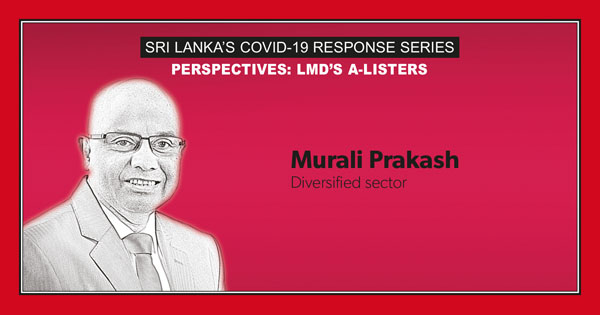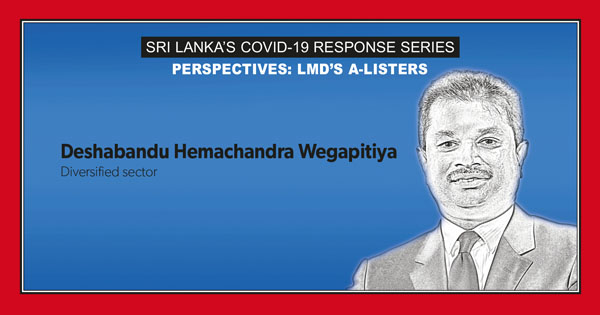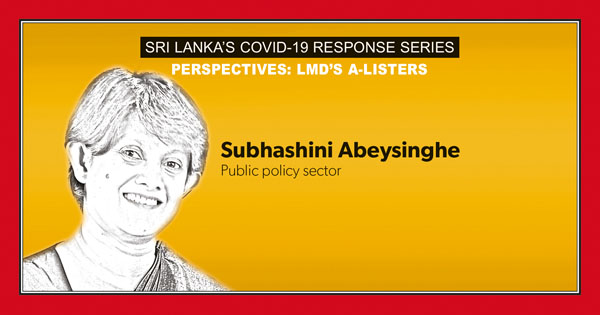RESILIENCE AMID TURBULENT TIMES
Q: How do you view Sri Lanka’s COVID-19 response so far? What are the pros and cons? A: From a pro-perspective, I admire the quick decision making and immediate lockdown measures, which saved many lives and put us on the right track. Moreover, the involvement of the military in this process…
Q: How do you view Sri Lanka’s COVID-19 response so far? What are the pros and cons?
A: From a pro-perspective, I admire the quick decision making and immediate lockdown measures, which saved many lives and put us on the right track. Moreover, the involvement of the military in this process provided additional validation for the strict enforcement of the curfew plan. As such, the government must be commended for its prompt initial response.
Conversely, the distribution of food and relief efforts weren’t properly carried out although the process was regulated as time passed. A certain degree of trial, error and confusion is permissible given the unprecedented nature of the crisis but I believe the response could have been handled better.
People seemed to lack confidence that sufficient food would be made available during curfew. Moreover, adequate mechanisms to purchase and store food do not seem to have been planned for initially by the government. This process could have been fulfilled from the beginning through the many mobile food delivery services, thereby avoiding long queues outside supermarkets.
With regard to granting relief efforts, the eligibility criteria should have been announced earlier through official channels instead of being delegated to lower government services such as Grama Niladharis and Samurdhi officers.
Overall, the response was executed well; however, the process was not announced in a timely manner with clear systems and strategies being made known to the public.
Q: In your view, how should the authorities balance the twin imperatives of safety and the economy?
A: As Sri Lanka is not as disciplined as countries such as Australia and New Zealand, it is inadvisable to compare their lockdown strategies with ours.
Ideally, shops and offices could have been reopened earlier to provide employment for daily wage earners. This would have reduced pressure on the government to continuously provide relief and subsidies on food. Alternatively, the government could have considered plans for resuming work earlier – at least twice a week – to assist daily wage earners.
Q: What is the outlook for jobs and employment in the medium term? And how should the authorities address the prospect of rising unemployment?
A: I am certain about Sri Lanka’s recovery as our businesses have been resilient amidst turbulent times such as during the protracted civil war.
To this end, I expect segments such as apparel and exports to gradually pick up while tourism may take at least another year to normalise. This would depend on the increased confidence of people to begin travelling and how well Sri Lanka manages its destination marketing.
However, the main concern lies in foreign remittances to Sri Lanka. A decline in inbound forex remittances – due to migrant workers being unable to return to their employment – will result in a substantial deficit in government income.
At least a million migrant workers generate several billion dollars’ worth of income for the country annually. Authorities must work together with the relevant countries to enable these employees to return to their jobs whilst assuring their safety.
The local recovery and even liquidity will take place slowly, and could eventuate as early as June next year. Export related industries may take slightly longer to recover, due to countries taking a protectionist and nationalistic stance in some circumstances during this time.
However, the stage is set with many opportunities arising from the geopolitical issues of the present time. Countries such as Indonesia, Cambodia and Sri Lanka are reasonably well placed to garner investments from European nations. The Sri Lankan government must take the lead in spearheading plans to promote our country as a destination for investment and employment.
The future is not as bleak as some may think and Sri Lanka has much to look forward to.
[wprpw_display_layout id=2]





